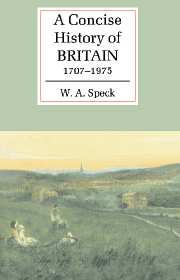Book contents
- Frontmatter
- Dedication
- Contents
- List of illustrations
- Preface
- Introduction
- 1 Eighteenth-century Britain
- 2 From the Anglo-Scottish Union to the Union with Ireland
- 3 Nineteenth-century Britain
- 4 From Pitt to Palmerston
- 5 From the second Reform Act to the Boer War
- 6 Twentieth-century Britain
- 7 From the Boer War to the first Labour government
- 8 From Baldwin to Attlee
- 9 From the accession of Queen Elizabeth to the entry into the European Economic Community
- Epilogue
- Appendix: Monarchs and ministries, 1707–1976
- Guide to further reading
- Index
7 - From the Boer War to the first Labour government
Published online by Cambridge University Press: 05 June 2014
- Frontmatter
- Dedication
- Contents
- List of illustrations
- Preface
- Introduction
- 1 Eighteenth-century Britain
- 2 From the Anglo-Scottish Union to the Union with Ireland
- 3 Nineteenth-century Britain
- 4 From Pitt to Palmerston
- 5 From the second Reform Act to the Boer War
- 6 Twentieth-century Britain
- 7 From the Boer War to the first Labour government
- 8 From Baldwin to Attlee
- 9 From the accession of Queen Elizabeth to the entry into the European Economic Community
- Epilogue
- Appendix: Monarchs and ministries, 1707–1976
- Guide to further reading
- Index
Summary
The years of the Boer War saw the Liberals divided and the Conservatives and Liberal Unionists united, while in the run up to the 1906 election these roles were reversed. The Unionists fell apart over education and tariff reform, measures which healed the divisions in the Liberal ranks.
Although Chamberlain sneered at the Liberals as being pro-Boer many supported the war, including a former prime minister, Rosebery, and a future premier, Asquith. There were rival dinner parties hosted by the two groups, which one wit satirised as ‘war to the knife and fork’. With the ending of hostilities, however, these divisions largely disappeared.
In 1902 an Education Act sponsored by A. J. Balfour alienated nonconformists and with them many of the government's Liberal Unionist supporters. It abolished the school boards and put secondary schooling under local education authorities, including Anglican schools which became rate supported. The hostile reaction of other Protestant denominations was to be expected. The conversion of a former Liberal to tariff reform, however, was not so predictable. Joseph Chamberlain came out strongly in favour of it as a solution to the problems besetting British industry from foreign competition. Although as colonial secretary he had become convinced of the advantages of imperial preference to protect trade before his advocacy of it at Birmingham in May 1903, his speech was regarded as a major challenge to the prevailing ideology of free trade.
- Type
- Chapter
- Information
- A Concise History of Britain, 1707–1975 , pp. 131 - 154Publisher: Cambridge University PressPrint publication year: 1993



